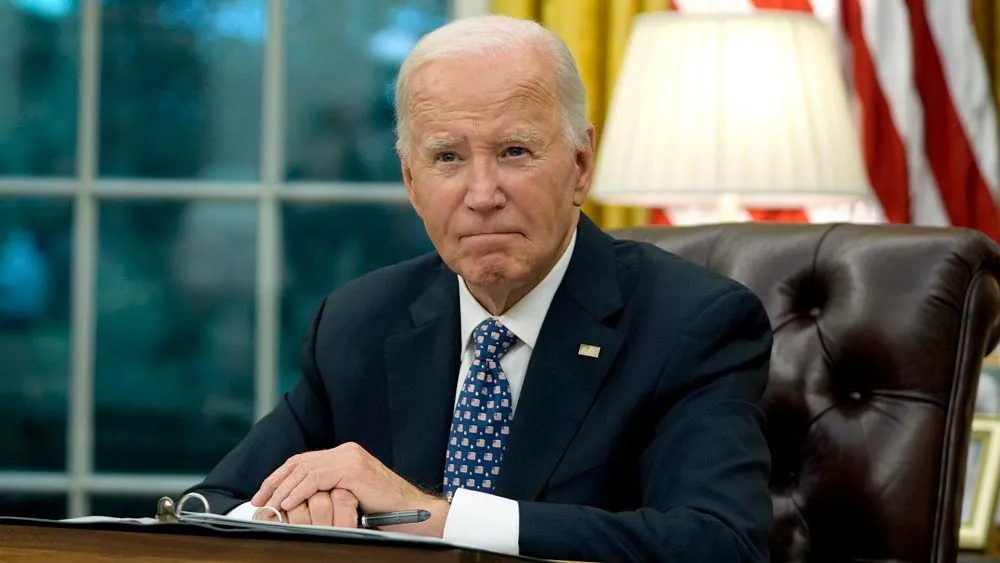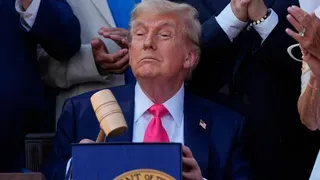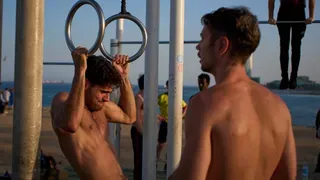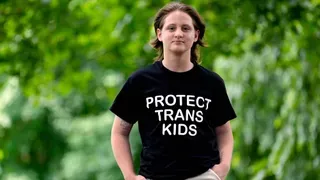January 20, 2012
Wilson Cruz Control
Kevin Mark Kline READ TIME: 15 MIN.
''I won't be specific,'' Wilson Cruz says, ''but there's a show on television right now, a fairly new show, that wanted me to come in for a role, and I found it incredibly offensive.''
His manager, Cruz tells Metro Weekly, had said no to auditioning for the role. But, Cruz - who made his first mark playing out high school student Rickie Vasquez on the '90s TV show, My So-Called Life, and then took on the role of Angel in Broadway's Rent - wanted her to go a step further.
''I said, 'I want you to call them back and tell them why I'm saying no. They need to know that this is really offensive, and they're going to get shit about it,''' he says. ''And she did, and they told her that I was being overly sensitive.''
Asked if the show's name rhymes with ''smirk bit,'' Cruz laughs and says, ''It might.''
ABC's Work It was canceled this past week, after significant criticism and insignificant ratings, and Cruz keeps pushing forward, fighting perceptions of queer people of color on stage and screen - and fighting for LGBT equality across the country.
After having served as a field organizer for the National Gay and Lesbian Task Force in 2002, Cruz will be ''returning'' to the Task Force for one weekend, performing a cabaret show about love at this year's Creating Change conference.
Rea Carey, the Task Force's executive director, first met Cruz while serving as the head of the National Youth Advocacy Coalition.
''Wilson - because it is his life - has the ability to give voice to queer people of color. He used to be, at that point, queer youth of color. And that was very rare in the '90s,'' she says. ''And, unfortunately, still, there aren't enough of those voices and enough of those stories that get told. Or probably more specifically, get listened to.''
Cruz works to tell others' stories on stage and screen for a living, but he also takes the time to, as he says, get his hands dirty and tell his own story to people across the country. Working with the Task Force in 2002, Cruz spent time in Miami-Dade working to protect the nondiscrimination ordinance there.
Sarah Reece, who works at the Task Force as the director of the Academy for Leadership and Action, was in Miami with Cruz. Of his work, she says, ''Folks understand that when they're with Wilson, he is someone who cares as much about his commitment to excellence as a performer as he does building a community that values all of us.''
Sometimes, that dedication comes with a price. On Election Day in Miami in 2002, there was a torrential downpour and Cruz decided to help a woman on her way to the polling place.
''I had an umbrella, and I went over to her car, helped her out of the car, and before I got to the 100-yard mark, I started to talk to her about how to vote on the issue,'' he says. ''She stopped and asked me if I was asking her to support gay rights, and I said yes - and she spit on me.''
Cruz kept on, though, walking her into the polling place, helping her back to her car when she was done voting, and - as always - keeping an optimistic outlook.
''Those are the chances you take,'' he says. ''She may have voted the wrong way that day, but I hope, in some way, she went home and thought about that experience and maybe she did vote differently later on.''
METRO WEEKLY: What will you be sharing with folks at Creating Change?
WILSON CRUZ: I'm actually doing a bit of a cabaret for them. It's called Love Child because, growing up, I had an affinity for the song ''Love Child.'' Just because I think I was a bit of a love child growing up.
My idea of love was a bit skewed. It was always about, if there was no pain involved, then it wasn't really love - really messed up.
I'm going to take people on a journey about love, what I've learned about love in the past 10 years. I think it's a great thing to talk to the Creating Change folks about because I've done a lot of this work. I've been a field organizer for the National Gay and Lesbian Task Force, I've worked on the Obama campaign, I'm a pretty political person. What I've realized is that, in doing my work as an activist and an organizer and such, we lose sight of what it is that we're actually fighting for.
I'm in the process of picking music that is going to help me tell that story. It's the story of falling in love, and what we do to sabotage that, and how we find ourselves ready to be open to loving again.
METRO WEEKLY: You say you grew up with a very different definition of love. Why is that?
CRUZ: Growing up with the parents that I've been allowed to have - that's how we define our loving experiences, by our parents and how our parents model that for us. My parents were very young when they had me - they were 19 - and they were unmarried when my mother became pregnant with me. I think the reality of their socioeconomic circumstances helped define what their relationship was. And, so, I viewed love through that prism.
They struggled in their relationship. It was about breaking up and getting back together and breaking up again. This back and forth was what I thought love was about - only to find out, later on, that it didn't have to be that way. At least, I decided that it doesn't have to be that way.
METRO WEEKLY: We hear, I think, a lot more today, more stories of difficulties faced by people of color coming out, and how those stories are less reflected in the media, in the public understanding of what coming out is. I just had the opportunity to see Pariah last weekend --
CRUZ: Amazing.
METRO WEEKLY: What is your experience of coming out, and how have you seen that reflected in public discussion of coming out?
CRUZ: I dealt with that issue a lot early on in my career - the coming-out process. And then I did a lot of speaking about it, at universities, to GLBT groups. In many ways, I've used my art and my life and my experience to convey what it was like for me to come out.
In many ways, all you need to do is watch 19 episodes of My So-Called Life and you'll see exactly what it was like. I wasn't forced out; I was prodded out by the fact that I was on this series that was dealing with this issue. And so I decided to come out publicly and with my family. I needed to do that because of the subject matter that we were dealing with on the show, and I knew that questions were going to be asked and I needed to be able to answer them from an authentic place.
METRO WEEKLY: So, you were cast for the show. Had you already had all of these conversations?
CRUZ: I wasn't out to my parents yet. I actually didn't come out to my parents until after the pilot of the show. I was out to everyone else in the world - except my parents. And, after having conversations with my parents, they clearly knew. They just didn't want to know.
There was a year between the pilot and the actual first episode that was shot because the show was passed over for the fall season the first time it was submitted. So, in that year, I came out to my parents. I came out to my dad at Christmas, just like the show did, and I was kicked out of my house and I lived in my car for a few months in between Christmas and the time that we actually started filming the series. I lived on people's couches if I had to, and that kind of thing. And we didn't reconcile, my father and I, until that episode actually aired, which was almost a full year later.
So, in a lot of ways, I owe that show my reality because I came out to my parents because of it. I reconciled with my father because of it. It was a very odd experience. It was very surreal.
METRO WEEKLY: And, in a broader context?
CRUZ: I feel like most of the coming-out stories we see in media are white and male, and that's why when I saw the short of Pariah at Outfest Fusion like three or four years ago, I was blown away. I got to meet the director and writer, Dee Rees, at that screening, and she was saying she wanted to make it into a full-length feature. I remember saying to her not only does she want to do it but that she needs to do it, and that I would support it in any way I could. Which is why, when it came here to New York and they asked me to be on the host committee of the premiere, I said, ''Absolutely.'' I have become friends with [Pariah star] Adepero [Oduye] because we sat on the jury of NewFest last year.
I think that the movie itself is, first of all, really beautifully done and the performances are ridiculous. But, above and beyond everything else, I feel like it really allows you into a world that we've never been allowed in before. It's so authentic that you don't feel like you're in a foreign country; you feel very much at home when you're watching it, even though it's a new place for all of us. This is a very specific story about a young woman of color and her experience, and yet I felt very in tune with everything that she went through.
I hunger for those stories to be told. In this day and age, that we don't see more of them is a travesty. And, more of a travesty is that - what is it, 20 years since My So-Called Life? - we have yet to have a major GLBT character of color like that on TV. We've had adults, but I'm talking about a youth.
I mean, thank God for Chris Colfer and for Glee and for all of the work that they're doing. I wish that Ugly Betty had stayed on for a few more years so they could have dealt with it more, because I thought that was very promising. But, I mean, hello? People want to see themselves. They want to turn the television on and feel like they're being seen and heard. I think there's an opportunity that's being missed there.
METRO WEEKLY: I think you were somewhat ahead of the curve in terms of this concept of actors and performers who are legitimately and actively involved in LGBT activism. During the New York marriage fight, it was clear that a corner had been turned and that many celebrities were involved. How do you see that process?
CRUZ: The more, the merrier. I welcome that. I welcome anyone who feels compelled to join this battle. When Gavin Creel started Broadway Impact and became as vocal as he did, I'm proud of him. I'm grateful for it.
I hope that, in some small way, I've modeled for people that it's okay to do that, but I hope that what I'm really modeling is that it's just not about putting your name on something. For me anyway, it's not about, ''Hey, Wilson Cruz is for gay marriage.'' Well, duh. But what is Wilson Cruz doing on the ground to make sure that that happens, beyond just putting his name on a host committee?
I like to get my hands dirty. I like to do the heavy lifting. That's why I work with the Task Force, because I feel out of all of the organizations - the national organizations that are around - that they're doing the heavy lifting. They're doing the hard, grassroots work that really needs to be done - which is why I worked for them for a year and worked in Miami on the human rights ordinance and in Portland [Maine] and in Ann Arbor, Mich. I took a year off of my career because I felt that strongly about it.
METRO WEEKLY: You have this odd experience of basically using national TV to come out. How did that change the process for you of moving forward in your career?
CRUZ: I'm not going to sugarcoat it in any way. It's been a tricky road. And what I mean by that is that I had one of the most amazing experiences that anyone probably would have just out of the gate.
It was inevitable that whatever came after that was going to be somewhat disappointing. Especially in light of the fact that I was a young man of color who was out, and there were very few opportunities. And so I had at the time, and still do, have to walk into a room and convince people that I'm the right person for the job - despite what it is that they have in their head about some preconceived notion about who that person is. I have to state my case and convince people that, ''Hey, he doesn't have to be white,'' or whatever the case may be.
I got lucky in a lot of ways. I did a couple of small movies I felt strongly about - All Over Me and Johns - early on, and then I got to do Rent. Rent was life altering for me. I felt like all of my gifts were being used at the same time. I felt very much at home in that world. And it was extremely challenging at the time. I don't know what made me think I could do it. It's the naivet� of youth. I don't know how I manifested that, but, ''Holla!''
METRO WEEKLY: And playing a role that already had become a -
CRUZ: Oh, yeah, the balls. To call my agent at the time, and be like, ''I know he just won the Tony ... but listen, I think I could do something really different with this and have my own spin on it.'' And that's literally what I said when I went in and met with Michael Greif. I said, ''I have no desire to copy with Wilson [Jermaine] Heredia did because Wilson Heredia is the best person to do what Wilson Heredia did. I am going to do this, and I hope you like that idea.'' And he looked at me like I had three heads. I was 22 years old! And he said, ''I can work with that.''
All that's to say, I got really lucky.
I still am in search of opportunities like that. In small ways, in big ways, I'm finding them. I think Noah's Arc, even though it was a small audience, I feel like that was a huge opportunity to do and say something and convey something about being an HIV-positive person today and what that means in relationships. I felt like we did that really well.
METRO WEEKLY: Even with Angel, though, that was a role that was another out person of color. Is there any role that you've gotten that you felt was changed to fit you more specifically?
CRUZ: I did a couple of episodes of The West Wing. It was a character who was C.J. Cregg's assistant press secretary of domestic affairs. That's how proud of it I am, I remember it.
I don't think they really pictured who they got. The great thing about the first episode that I did, most of the episode was improvised because it was an episode that was shot as a documentary. Alex Graves, who was directing the episode, said, ''I want to do this thing where I'm interviewing a bunch of you guys, and I'm just going to speak to you as a documentary filmmaker. I'm going to ask you questions, and you make up the answers.''
I was like, ''Fuck, yeah!'' I had already made up this back-story for myself, and he asked the magic question. He was like, ''How did you end up in this job?'' And I just let him have it: ''I went to Howard University. I was writing letters to the administration about how they were dealing with GLBT issues.''
And when we cut, he was just like, ''Are you fucking kidding me? Just so you know, that is so in the show.''
For years, I was like, ''I have to get on there.'' I was too young. What was I gonna do on there? Finally, I was old enough and the right thing came along and they brought me in, and I was like, ''Yes! Bring it!''
Now I feel that way about The Good Wife. I'm obsessed with that show.
METRO WEEKLY: On the other hand, what is the worst experience you've had when being out or being a person of color has really made it more difficult or impossible to get a part?
CRUZ: That's a harder question. I haven't really had a horrible experience. And, here's the thing: Nobody's gonna come out and tell me, ''Hey, the reason why you didn't get this job is because you're gay or you're Puerto Rican.'' But I know it's happened. Just like I know at times I didn't get the job because I wasn't the best person or the right person. It's just reality.
I can't really answer that question in a specific way because I'm not privy to that information, so it would be me guessing - and we don't want to do that.
METRO WEEKLY: If you were to give yourself, on leaving My So-Called Life, some advice on moving forward with your career, what would it be?
CRUZ: I probably would have said yes more often than I did. I think what I've learned in my old, old age is that that old improv rule is good for life, too. The rule in improvisation is, ''Always say yes.''
I've said no to things that I feel strongly about, but I think early on I probably could have said yes to more stuff. I think, early on, you think it's going to affect the trajectory of your career. And not everything does. Sometimes it's just about -
METRO WEEKLY: Some things are just a role.
CRUZ: Yeah. And sometimes it's just fun. I should have had more fun early on. I'm having more fun now, I'll tell you that. I'm having so much more fun in my work than I did then.
METRO WEEKLY: What's the most fun thing you're doing?
CRUZ: The Finder. It's like playing. When you're a kid, and you're like, ''Let's play act.'' That's what it's like. They let me do the most ridiculous - sometimes I do something just to see if I can get away with it, and they love it and they're like, ''Do more of that!''
Some people are going to think it's over the top, but I just think it's funny. And I never get to be funny - not that funny. It's my chance to be Lucille Ball and Rosie Perez and John Leguizamo all wrapped up in one.
METRO WEEKLY: I don't know if it is possible to really separate it, but do you think it's harder for young out gay actors or young actors of color to ''break out'' in Hollywood today?
CRUZ: It depends on the day. I'm telling you, if you had asked me this last week, I would have said something different. My very first thought when you asked the question was the George Lucas story about the movie he has out now, Red Tails. The fact that people did come right out and tell him, ''No, we're not going to back this movie because there are no white people in it.'' I mean, where else could someone get away with saying that? I think that's the truth of it, and I applaud Mr. Lucas for going public with it.
I think, in the end, we're all looked at as dollar signs. Every actor is a dollar sign, and we're attached to a certain amount of money based on who we are. What color your skin is, and who you have sex with, and if you fit in a certain gender role. The only way that my career could possibly be any harder is if I was a transgender woman. Whoever that is and is doing it - oh, Candis Cayne, she's got it harder. RuPaul.
It's not an easy industry to be a part of, but when you get the opportunity to work, it's magic. And I'm grateful for it, every time. That's why, whenever I do get work, I just enjoy it - because I don't know when it's going to happen again.
METRO WEEKLY: One of the things some people have criticized about the push for marriage is whether other issues affecting people with a lower socioeconomic status, and disproportionately affecting LGBT people of color, like the Employment Non-Discrimination Act, are falling of the charts.
CRUZ: I don't know who it was, but a group of people decided that marriage was our ticket to everything else. And, where I didn't completely agree with it - my thing about marriage is that it's not so much that I need or want to get married. I just don't want anybody to tell me that I can't based on the fact that I'm gay.
Do I believe that there are other things that are more important? Of course. I wish that we had put more energy into ENDA than we have. I wish we had put more energy into not getting [the Defense of Marriage Act] to go through in the first place.
I know the thinking behind it. I know the political sense behind it, which is that it helps the larger society see our community and our relationships on equal footing and that that would lead to other things. But I feel like in a lot of ways our community and our movement has said, ''This is the one and only goal at the moment and there isn't anything else.''
Which is why I work so hard with [Gay, Lesbian and Straight Education Network], because they're dealing with youth issues in a way that nobody else is. I think that's as important, if not more, than marriage equality.
But that's my personal thing. I don't even have a boyfriend.
METRO WEEKLY: Alas.
CRUZ: So, it's hard for me to wrap my brain around marriage right now. So, maybe that's my own myopic point of view. I'm like, ''Can I get a date?'' That would be great. I would love to pass a law where I would get a date every week.
METRO WEEKLY: Who would that person be?
CRUZ: You know what? If I had the answer to that I would be busy finding him. Good lord.
METRO WEEKLY: Well, Claire Danes got Hugh Dancy, so he's gone.
CRUZ: So cute, that one. You know, if Ryan Gosling wanted to come over to the other side, I'm open to that. Everybody knows that I have a soft - and a hard - place for Joe Manganiello. But who doesn't? The word ''man'' is in his name. I'm just sayin'. But, you know, a girl can dream.
METRO WEEKLY: He says, mopping his brow.
CRUZ: I just did, actually. So, if you know anybody, let me know.
METRO WEEKLY: We will look for some combination of Ryan Gosling and Joe Manganiello, then you'll fall over.
CRUZ: Right. I'm - anyway, I'll let this go. We don't want this to be my Grindr profile or something.







